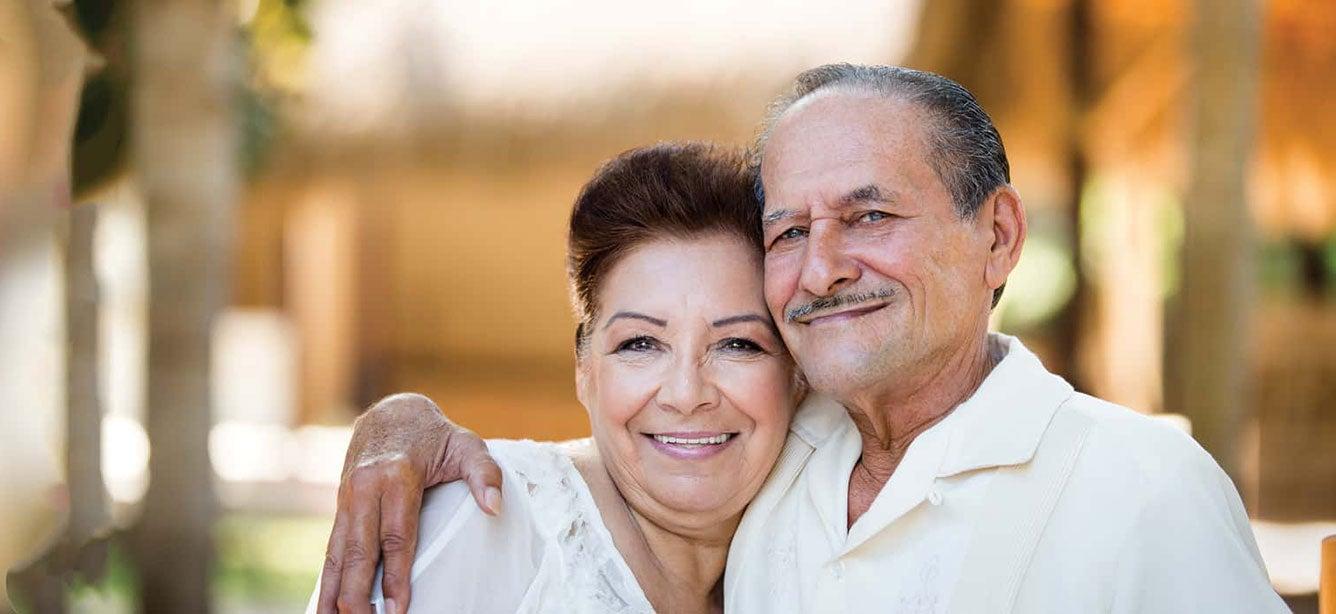
Nursing homes provide a safe, comfortable, and engaging environment for older adults who can no longer live independently. They also offer relief for relatives and caregivers who were caring for their family member at home. Medicaid is a vital source of funding for this type of long-term care, relieving older adults and their loved ones of what can be a major expense.
What is Medicaid?
Medicaid is a public health insurance program for Americans with limited financial means. It serves eligible older adults as well as younger adults, children, expectant mothers, and people with disabilities. Medicaid is different than Medicare, a federal health insurance program that covers medical services for older adults and people with certain disabilities.
If you or someone you care about has—or may be eligible for—Medicaid benefits, you may wonder: Does Medicaid cover nursing homes? First, it’s important to know more about this type of long-term care.
What are nursing homes?
Nursing homes (or "skilled nursing facilities") are designed for people who don't need hospital care but cannot safely remain at home. These facilities provide 24/7 supervision and nursing care as well as services like:
- Three meals a day
- Help with personal care tasks (e.g., dressing and toileting)
- Physical, occupational, respiratory, and speech therapies
- Social and recreational activities
Older adults may stay in a nursing home for a brief period—for example, to finish recovering after a hospital stay. But most nursing home residents remain there permanently because they require ongoing assistance.
Does Medicaid cover nursing home costs?
In short, yes. Most nursing homes accept Medicaid as a form of payment, but not all of them. Medicaid-covered nursing home care is only available for eligible beneficiaries and when there are no other options for payment.
What nursing home expenses does Medicaid cover?
If you meet eligibility requirements, Medicaid will pay 100% of nursing home costs. Below are some of the services generally covered under Medicaid with no out-of-pocket costs to the resident:
- Room and board
- Skilled nursing care
- Personal hygiene supplies
- Meals
- Medications (prescription and over the counter)
- Rehabilitation services
- Social services (medically related)
- Tailored program of activities
- Emergency dental care
- Room and bed maintenance
Residents may be charged for extra services, such as:
- A private room
- Cosmetic and grooming items
- Plants and flowers
- Specially prepared food
- Personal reading materials
Medicaid covers nursing home care for eligible beneficiaries for as long as that level of care is necessary, whether it’s for a few weeks or months—or for the rest of that person’s life.
Does Medicaid eligibility vary state by state?
Since Medicaid is a state-level program, each state has its own unique eligibility requirements and coverage limitations (reach out to your state’s Medicaid office to learn about the program guidelines in your state).
Generally speaking, medicaid eligibility is typically based on your income and assets, and eligibility rules vary from state to state. You may qualify for Medicaid nursing home care even if you previously have not been eligible for other Medicaid services.
Assessing your eligibility
There are two sets of criteria you’ll need to meet to receive nursing home care coverage under Medicaid:
- Level-of-care criteria: Nursing Home Level of Care (NHLOC) is a measurement that looks at the type of care a person needs; this determines if they are eligible for Medicaid nursing home care. Each state sets its own criteria for NHLOC, and the assessment tools used may vary. Generally, these assessments focus on areas like physical functional ability, cognitive functioning, medical needs, and behavioral issues. If it's determined an applicant does not need the level of care typically provided in a nursing home, Medicaid will not pay for coverage.
- Financial criteria: To receive nursing home coverage, you must meet certain Medicaid income limits and asset limits. These limits, which change every year, are based on your marital status and the state in which you live. Most states will consider income and assets from the last five years in determining eligibility.
If you initially do not meet Medicaid requirements and must pay out of pocket for nursing home care, there is another path to Medicaid eligibility. This is called the Medicaid spend-down program, also referred to as the "medically needy" program.
What is the Medicaid spend-down program?
Once you "spend down" all countable assets (as determined by your state) to a certain level, you can qualify to receive Medicaid benefits. Medicaid then steps in and covers the rest of your nursing home costs.
In exchange for having your nursing home costs paid for, you must give up nearly all your income to Medicaid. But you will be allowed to keep a small monthly stipend. The amount varies by state.
“While there is some overlap, Medicaid programs tend to be very individual to each state,” said Rosalind Newsholme, Program Associate with NCOA's Center for Economic Well-Being. “That’s why it’s so important to check directly with your state’s Medicaid agency to find out what their specific guidelines are for nursing home coverage.”
How do I find nursing homes that accept Medicaid?
Medicaid-certified facilities
Only nursing homes licensed and certified as a Medicaid Nursing Facility (NF) can accept Medicaid patients. Medicaid-certified facilities provide very specific, medically indicated care that falls within Medicaid coverage guidelines. Also, these nursing homes meet strict standards for quality and safety and are overseen by state survey agencies.
Visit Medicare.gov to search for and compare Medicare- and Medicaid-certified nursing homes in your area.
Researching facilities
How do you find the right Medicaid-certified nursing home for yourself or a family member? Visiting local nursing homes in person—or having someone else visit on your behalf—is a great way to determine which one meets your needs. An on-site visit gives you the opportunity to get a feel for the setting and talk to residents and staff personally.
Don’t be afraid to ask questions when calling or visiting nursing homes. Write them down ahead of time so that you don’t forget any. Here are some good questions to ask when researching Medicaid nursing facilities:
- Is this nursing home Medicaid- and/or Medicare-certified?
- What are the staffing ratios? How about the turnover rate?
- What is the screening process for hiring staff?
- Are vaccinations (such as for flu and COVID-19) required for all staff members?
- What is your current visitation policy?
- Do I get to choose when I get up and go to bed?
- How does your facility prevent infections?
- What types of meals are served daily?
- What kinds of activities are available?
- Who do I go to if I have a problem with my care?
Comparing Medicaid and Medicare for nursing homes
Medicaid and Medicare differ when it comes to long-term care coverage. For those eligible, Medicaid pays 100% of care received at a Medicaid-certified nursing facility—but many people will need to contribute most of their income to the cost of their care. There is no time limit on the length of a covered stay.
Original Medicare, on the other hand, does not cover any type of long-term care whether in a nursing home, assisted living, or at home. It only covers up to 100 days of care in a skilled nursing facility for eligible beneficiaries in a single benefit period. Although you'll pay nothing out of pocket for days 1-20, a daily copayment will apply for subsequent days ($217 in 2026). Stays longer than 100 days must be paid for through other means.
Frequently asked questions about nursing homes and Medicaid
How much does Medicaid pay for nursing homes?
In most cases, Medicaid pays for 100% of costs in a Medicaid-certified nursing home as long as you meet all eligibility requirements.
What nursing home facilities accept Medicaid?
Nursing homes are not required by law to accept Medicaid residents. But most of them do. Facilities that participate in Medicaid must deliver specific nursing and related services focused on ensuring residents' physical and mental well-being. To find a Medicaid-certified facility in your area, use Medicare’s Nursing Home Compare tool.
How do I find out if I’m eligible for Medicaid?
Eligibility rules vary from state to state. To learn if you qualify for Medicaid, contact your state's Medicaid office. You can also visit HealthCare.gov to see if you qualify for Medicaid based on your income.
What are “Medicaid beds?”
A "Medicaid bed" refers to the beds in a skilled nursing facility designated for residents whose care will be covered by Medicaid. Some facilities have all Medicaid beds, while others may have some beds dedicated to residents who pay for their care out of pocket (private pay).
Nursing homes are legally bound to provide the same quality of care to all residents, regardless of how their care is being paid for.
Take the time to understand all your long-term care options
When it comes to finding the right Medicaid nursing home, be sure to do your research. It’s always a good idea to seek expert advice before making any decisions about long-term care. Your local Medicaid office or a trusted legal professional are good places to start.
You can also use NCOA's BenefitsCheckUp tool to get info on benefits programs that can help you stay healthy and age well. Just type in your ZIP code to find help with everyday essentials like groceries, health care, housing, utilities, and prescription drugs.



